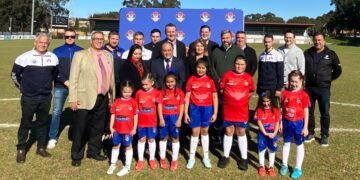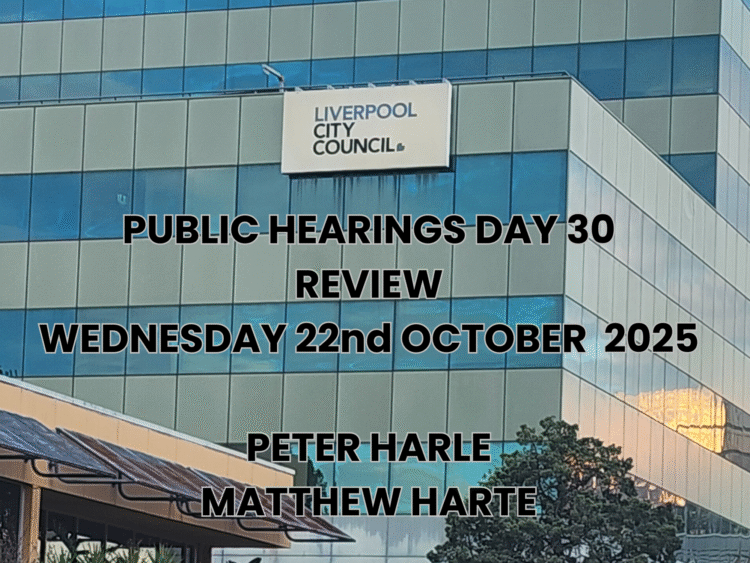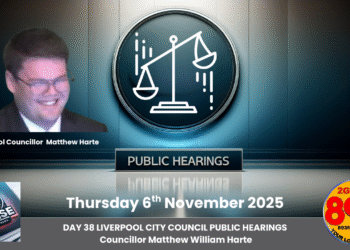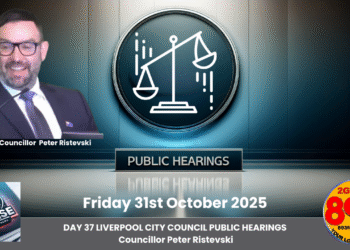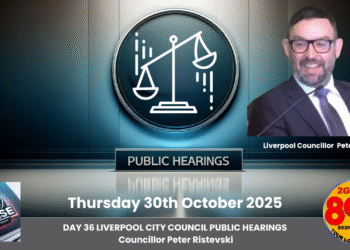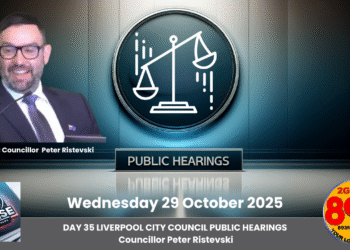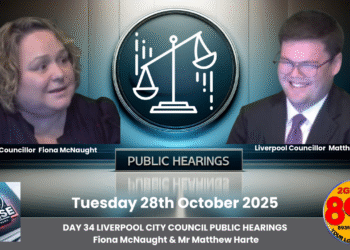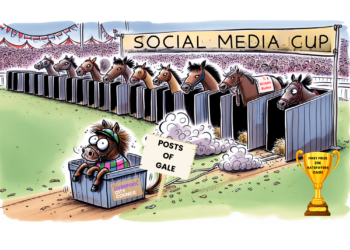Opening and Councillor Peter Harle’s Testimony
- Document Tendering: The hearing began with Senior Counsel Assisting, Ms T McDonald SC, tendering documents related to evidence from Jason Breton and Shayne Mallard, along with an updated tender bundle index. Some documents were subject to potential non-publication orders, to be addressed as needed.
- Councillor Harle’s Continued Evidence: Councillor Harle, under oath from the previous day, was questioned by Ms Hamilton-Jewell, counsel for Councillor Ristevski. Topics included a 24-25 September 2025 council meeting where Harle advised Ristevski to amend a notice of motion to reference “evidence” instead of “findings” from the inquiry. Harle denied claims that he did not discuss social media concerns with Ristevski, asserting a conversation occurred during a break with witnesses present.
- Council Dysfunction Debate: Harle was challenged on his prior testimony labeling Councillor Ristevski as a “rogue councillor” causing division. Examining the minutes of an extraordinary meeting on 14 October 2025, which Harle attended and seconded an urgency motion, it was noted that Ristevski rarely spoke and did not contribute to the heated debate, leading to questions about the accuracy of Harle’s earlier claims of division caused by Ristevski.
- Budget Concerns: Harle reiterated his April 2024 budget criticism, calling it a “fake budget” due to projected surpluses based on unsold properties, especially significant in an election year to present a positive financial image.
Councillor Matthew Harte’s Testimony
- Introduction and Background: Councillor Matthew Harte, sworn in as a witness, confirmed his role as a councillor elected in September 2024 for the North Ward, affiliated with the Liberal Party. Aged 22 at election time, Harte works as an electorate officer for Tina Ayyad, wife of Mayor Ned Mannoun, since April 2023.
- Political Involvement: Harte joined the Liberal Party in early 2020 through the Young Liberals, introduced by Julia Kokic during university. He met Mayor Mannoun in late 2020, leading to involvement in Liverpool’s Liberal politics, including campaigning for the delayed 2021 local election. Residing in Peakhurst Heights (outside Liverpool LGA), Harte qualified for candidacy via the non-residential roll, nominated by Tarek Hafda of Hafda Butchery on Memorial Avenue to vote on the business’s behalf.
- Training and Role: Harte received induction training on the Code of Meeting Practice and Code of Conduct shortly after election, along with ongoing training like WHS and budgeting workshops. He acknowledged the diversity of political affiliations on the council (Liberal, Labor, and other groups like Our Local Community and Liverpool Community Independents Team) and the inevitability of differing opinions.
- Free Speech and Social Media: Harte agreed on the importance of robust political debate and the implied freedom of political communication, while noting limits against derogatory content. Unlike many councillors, he maintains no public social media pages as Councillor Harte, citing the potential for online discourse to become “nasty and dirty.” He was briefly introduced to a June 2025 guideline on “Free Speech in Local Government in NSW” but had not reviewed it in detail, though he agreed with its principles on community engagement and public comment.
Matters Arising of Interest to Ratepayers: Are Ratepayers Getting Good Value for Money?
Ratepayers of Liverpool City Council are concerned about whether their contributions result in effective governance and sound financial management. The following matters from Day 30 of the inquiry highlight areas where value for money is questioned:
- Governance and Councillor Conduct:
- Council Division and Accountability: Councillor Harle’s testimony revisited claims of dysfunction attributed to a “rogue councillor” (Ristevski), yet evidence from the 14 October 2025 meeting showed Ristevski’s minimal participation, suggesting division may stem from broader councillor dynamics. Heated debates, multiple points of order, and speaking over each other indicate inefficiencies in council meetings, potentially wasting time and resources. Ratepayers may question if internal conflicts detract from addressing community needs, reducing the value of their rates.
- Councillor Engagement and Training: Councillor Harte’s limited familiarity with key guidelines like “Free Speech in Local Government” and absence from related workshops (e.g., social media policy) raises concerns about whether new councillors are adequately prepared to navigate complex governance issues. If councillors are not fully trained or engaged, ratepayers may not receive the informed representation they fund.
- Financial Transparency and Political Influence:
- Budget Manipulation Concerns: Harle’s description of the April 2024 budget as “fake” due to projected surpluses from unsold properties, particularly in an election year, suggests a lack of transparency. Presenting a positive financial image for political gain rather than reflecting true fiscal health could mislead ratepayers about council stability, questioning the value of rates spent on potentially inaccurate reporting.
- Political Affiliations and Representation: Harte’s election via the non-residential roll, facilitated by a business nomination, and his close ties to Mayor Mannoun (through employment with Mannoun’s wife) may concern ratepayers about whether councillors represent community interests or party agendas. Additionally, Harte’s lack of residence in Liverpool LGA could raise questions about his connection to local issues, potentially affecting the quality of representation ratepayers expect.
- Community Engagement and Communication:
- Social Media and Public Debate: Harte’s decision to avoid public social media as a councillor, despite acknowledging the importance of robust debate, limits direct communication channels with ratepayers. While he prioritises avoiding “nasty” online interactions, this absence may hinder transparency and accessibility. Ratepayers may wonder if their money funds a council that effectively engages with them, especially when other councillors use social media to voice concerns (e.g., financial deficits).
- Policy Announcements: Harle’s lack of prior knowledge about Mayor Mannoun’s $50 million sports facility announcement with the Liberal Party in March 2023, unreported to council beforehand, suggests potential bypassing of democratic processes. Ratepayers may question if such unilateral commitments of significant funds align with community priorities, impacting the value derived from their contributions.
Conclusion
The Day 30 proceedings of the Public Inquiry into Liverpool City Council reveal ongoing challenges in governance, transparency, and community engagement that affect whether ratepayers are receiving good value for their money. Internal divisions and inefficiencies in council meetings, coupled with concerns over budget transparency and political influence in councillor roles, suggest resources may not be optimally directed to community benefits. The limited engagement of newer councillors like Harte with policy guidelines and public communication channels further questions the effectiveness of representation. Ratepayers deserve assurance that their rates fund transparent, accountable, and community-focused governance, yet evidence from this hearing highlights areas where value for money remains uncertain. As the inquiry progresses, these issues warrant scrutiny to ensure improvements at Liverpool City Council.

